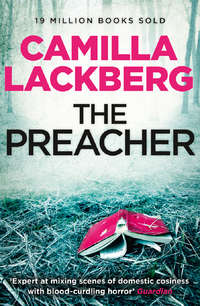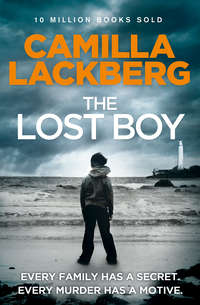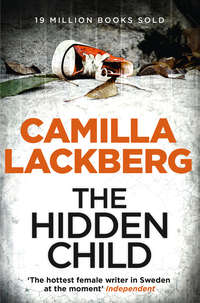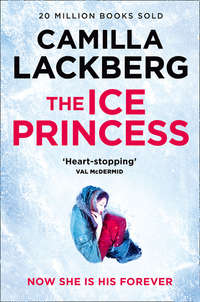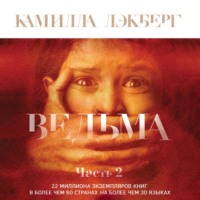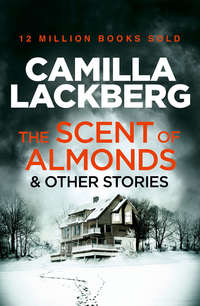
Полная версия
The Girl in the Woods
Her parents had been transformed into the living dead when Stella was found murdered, and she understood why. Certain people were born with a brighter light than others, and Stella had been one of them. Always happy, always cheerful, always offering kisses and hugs to everyone. If Sanna could have died instead of Stella on that hot summer morning, she would have gladly taken her place.
But Stella was the one who was found in the lake. After that, nothing was left.
‘Excuse me, but are there any roses that are easier to take care of than others?’
Sanna gave a start and looked up at the woman who had come over without her noticing.
The woman smiled, and the furrows on Sanna’s face relaxed.
‘I love roses, but I’m afraid I don’t have green fingers.’
‘Is there a specific colour you’d like?’ asked Sanna.
She was an expert at helping people find the plants best suited to them. Certain people did better with flowers that needed a lot of care and attention. They were able to make orchids thrive and blossom, and they’d have many happy years together. Other people could barely even take care of themselves, so they needed plants that were tolerant and strong. Not necessarily cacti – those she saved for the worst cases – but she might suggest, for instance, a Peace Lily or a philodendron. And she took pride in always pairing the right plant with the right person.
‘Pink,’ said the woman dreamily. ‘I love pink.’
‘In that case, I have the perfect rose for you. It’s called a burnet rose. The most important thing to remember is to give it some extra attention when you plant it. Dig a deep hole and soak the soil with water. Add a little fertilizer – I’ll give you the right kind – before you put in the rosebush. Fill in the hole and water it again. Watering is very important in the beginning when the roots are taking hold. Once it’s established, it’s more a matter of regular maintenance so the rosebush doesn’t dry out. And cut it back every year in early spring, when buds are starting to appear on the birch trees.’
The woman cast an adoring glance at the rosebush Sanna placed in her trolley. She understood completely. There was something special about roses. She often compared people to flowers. If Stella had been a flower, she would definitely have been a rose. Rosa Gallica. Lovely, magnificent, with layer upon layer of petals.
The woman cleared her throat.
‘Is everything all right?’ she asked.
Sanna shook her head, realizing that once again she’d got lost in memories.
‘Yes, I’m fine, just a little tired. This heat …’
The woman nodded at her vague reply.
Actually everything was not all right. Evil had returned. Sanna could sense it as clearly as she smelled the fragrance from the roses.
Being on holiday with children couldn’t really be classified as relaxing, thought Patrik. It was an odd combination of all that was wonderful and yet completely exhausting. Especially when he had sole responsibility for all three kids while Erica went to lunch with Anna. Against his better judgement, he’d taken them to the beach to keep them from climbing the walls at home. It was usually easier to prevent them from fighting if they were fully occupied, but he’d forgotten how the beach could make things more difficult. For a start, there was always the risk of drowning. Their house was in Sälvik, right across from the bathing area, and many times he’d woken in a cold sweat after dreaming that one of the kids had slipped out and wandered down to the sea. Then there was the sand. Noel and Anton insisted not only on throwing sand at other children, which earned Patrik angry looks from other parents, but they also, for some inexplicable reason, enjoyed stuffing sand in their mouths. The sand was one thing, but Patrik shuddered to think of all the other nasty things going into their little mouths along with it. He’d already taken a cigarette butt out of Anton’s sandy fist, and it was only a matter of time before a piece of glass followed. Or a pinch of discarded snuff.
Thank God for Maja. Sometimes Patrik felt guilty his little girl took on so much responsibility for her younger brothers, but Erica always claimed Maja enjoyed doing it. Just as Erica had enjoyed taking care of her own little sister.
Right now Maja was watching the twins so they didn’t go too far out in the water. If they did, she hauled them back towards shore with a firm hand, checking to see what they’d put in their mouths, and brushing off the other children when her little brothers threw sand at them. Sometimes Patrik wished she wasn’t always so dutiful; he worried she’d have plenty of ulcers ahead of her if she continued to be such a conscientious child.
Ever since the heart trouble he’d experienced a few years back, he knew how important it was to take care of himself, allowing time to rest and unwind. But it was questionable whether being on holiday with the kids fit the bill. Much as he loved his children, on days like these he longed for the peace and quiet of the Tanumshede police station.
Marie Wall leaned back in her deckchair and reached for her drink. A Bellini. Champagne and peach juice. Well, not like at Harry’s in Venice, unfortunately. No fresh peaches here. She had to make do with the cheap champagne the skinflints at the film company had put in her fridge, mixed with ProViva peach juice. She had demanded that the ingredients for Bellinis should be here when she arrived and it seemed this was the best they could come up with.
It was such a strange feeling to be back. Not back in the house, of course. It had been demolished long ago. She couldn’t help wondering whether the people who owned the new house built on that plot were haunted by evil spirits after everything that had gone on there. Probably not. No doubt the evil had gone to the grave with her parents.
Marie took another sip of her Bellini. She looked around and wondered where the owners of this house had gone. A week in August with fantastic summer weather should have been the time when they got the most enjoyment out of a house that must have cost them millions, both to buy and to renovate, even if they didn’t spend much time in Sweden. Presumably they were at their chateau-like property in Provence, which Marie had found when she googled their name. Rich people seldom settled for anything less than the best. Including summer houses.
Yet she was grateful to them for renting out their house. This was where she retreated each day the moment filming was finished. She knew it couldn’t last. Some day she was bound to run into Helen, and she’d no doubt be struck by how much they had once meant to each other, and how much had changed since. But she wasn’t yet ready for that.
‘Mamma!’
Marie closed her eyes. Ever since Jessie was born, she’d tried in vain to get her to use her first name instead of that dreadful label. But the child had insisted on calling her ‘Mamma’, as if by doing so she might change Marie into one of those dowdy earth-mother types.
‘Mamma?’
The voice was right behind her, and Marie realized she couldn’t hide.
‘Yes?’ she said, reaching for her glass.
The bubbles prickled her throat. Her body grew softer and more pliant with every sip.
‘Sam and I were thinking of going out in his boat for a while. Is that okay?’
‘Sure,’ said Marie, taking another sip.
She peered at her daughter from under the brim of her sun hat. ‘What do you want?’
‘Mamma, I’m fifteen,’ said Jessie with a sigh.
Good God, Jessie was so pudgy it was hard to believe she was her daughter. Thank goodness she’d at least managed to meet a boy since they’d arrived in Fjällbacka.
Marie sank back and closed her eyes, but only for a second.
‘Why are you still here?’ she asked. ‘You’re blocking the sun, and I’m trying to get a tan. I need to go back to filming after lunch, and they want me to have a natural tan. Ingrid Bergman looked as brown as a gingerbread biscuit when she spent her summers on the island of Dannholmen.’
‘I just …’ Jessie began, but then she turned on her heel and left.
Marie heard the front door slam. She smiled to herself. Alone at last.
Bill Andersson opened the lid of the basket and took out one of the sandwiches Gun had made. He glanced up before swiftly shutting the lid. The seagulls were quick, and if he didn’t watch out they would steal his lunch. Here on the pier, he was particularly vulnerable.
Gun poked him in the side.
‘I think it’s a good idea, after all,’ she said. ‘Crazy, but good.’
Bill closed his eyes for a moment as he took a bite of his sandwich.
‘Do you mean that, or are you only saying it to make your husband happy?’
‘Since when do I say things to make you happy?’ Gun replied, and Bill had to admit she was right.
During the forty years they’d been together, he could recall only a few times when she had not been brutally honest.
‘Well, I’ve been thinking about this ever since we saw that documentary, Nice People, about the Somali bandy team that lives and trains here in Sweden. In my opinion, something similar ought to work here too. I talked with Rolf at the refugee centre, and they’re not having much fun up there. People are such cowards, they don’t dare approach the refugees.’
‘I get treated like an outsider in Fjällbacka because I’m from Strömstad,’ said Gun, reaching for another fresh roll, bought at Zetterlinds, and slathering it with butter. ‘If locals treat people from the next county as foreigners, it’s no surprise they’re not exactly welcoming the Syrians with open arms.’
‘It’s about time everybody changed their attitude,’ said Bill, throwing out his hand. ‘These people have come with their children, fleeing from war and misery, and they’ve had a terrible journey getting here. So the locals need to start talking to them. If Swedes can teach people from Somalia to ice-skate and play bandy, surely we should be able to teach Syrians to sail. Isn’t Syria on the coast? Maybe they already know how to sail.’
Gun shook her head. ‘I have no idea, sweetheart. You’ll have to google it.’
Bill reached for his iPad, which he’d put down after completing their morning Sudoku puzzle.
‘I’m right, Syria does have a coastline, but it’s hard to know how many of these people lived near the sea. I’ve always said, anybody can learn to sail. This will be a good chance to prove I’m right.’
‘But wouldn’t it be enough for them to sail for fun? Why do they need to compete?’
‘According to the documentary, those Somalis were motivated by accepting a real challenge. It became a kind of statement for them.’
Bill smiled. It felt good to express himself in a way that sounded both knowledgeable and reasonable.
‘Okay, but why does it have to be a – what was it you said? A “statement”?’
‘Because it won’t have any impact otherwise. The more people who get inspired, like I was, the more it will have a ripple effect, until it becomes easier for refugees to be accepted by society.’
In his mind, Bill pictured himself instigating a national movement. This was the way all big changes started. Something that began with the Somalis entering the world bandy championships and continued with the Syrians competing in sailing contests could lead to anything at all!
Gun placed her hand on his and smiled at him.
‘I’ll go and talk to Rolf today and set up a meeting at the centre,’ said Bill, reaching for another roll.
After a moment’s hesitation he picked up a second roll and tossed it to the seagulls. After all, they too were entitled to food.
Eva Berg pulled up the stalks and placed them in the basket next to her. As usual, her heart skipped a beat when she looked out across the fields. All this was theirs. The history of the place had never troubled them. Neither she nor Peter was especially superstitious. Yet when they bought this farm ten years ago there had been a lot of talk about all the misfortunes that had struck the Strand family, the former owners. But from what Eva understood, a single tragic event had caused all the other troubles. The death of little Stella had brought about the sad chain of events that had befallen the Strand family, and that had nothing to do with this farm.
Eva leaned forward to look for more weeds, ignoring the ache in her knees. For her and for Peter, their new home was paradise. They were from the city, if Uddevalla could be called a city, but they’d always dreamed of living in the country. The farm outside Fjällbacka had seemed perfect in every respect. The fact that the asking price was so low because of what had happened here simply meant it was within their budget. Eva hoped they had been able to fill the place with enough love and positive energy.
Best of all was the way Nea was thriving here. They’d named her Linnea, but ever since she was tiny, she’d called herself Nea, so it was only natural for Eva and Peter to call her that too. She was now four years old and so stubborn and headstrong that Eva was already dreading her teenage years. But it seemed she and Peter were not going to have more children, so they’d at least be able to focus all their attention on Nea when the time came. At the moment, those days seemed very far away. Nea ran around the farm like a little ball of energy, with her fluff of blond hair, which she’d inherited from Eva, framing her bright face. Eva was always worried that the child would get sunburned, but she merely seemed to get more freckles.
Eva sat up and used her wrist to wipe the sweat from her forehead, not wanting to smudge her face with the dirty gardening gloves she wore. She loved weeding the vegetable garden. It was such a refreshing contrast to the work of her office job. She took a childish pleasure in seeing the seeds she’d sown become plants that grew and flourished until they could be harvested. Their garden was intended only for their own use, since the farm couldn’t provide them with an income, but they were able to meet much of their household needs with a vegetable garden, a herb garden, and a field of potatoes. Yet occasionally she felt guilty about how well they were doing. Her life had turned out better than she’d ever imagined. She needed nothing more than Peter, Nea, and their home on this farm.
Eva began pulling up carrots. Off in the distance she saw Peter approaching on the tractor. His regular job was working for the Tetra Pak company, but he spent as much of his free time as possible on the tractor. This morning he’d gone out early, long before Eva was awake, taking along a sack lunch and a Thermos of coffee. A small wooded area belonged to the farm, and he’d decided to clear out the underbrush, so she knew he’d bring back firewood for the winter. He’d no doubt be sweaty and filthy, with aching muscles and a big smile.
She put the carrots in her basket and pushed it aside. The carrots were for the supper she’d cook this evening. Then she took off her gardening gloves and dropped them next to the basket before she headed towards Peter. She squinted her eyes, trying to catch sight of Nea on the tractor. She’d probably fallen asleep, as she always did. It had been an early start for the child, but she loved going to the woods with Peter. She loved her mother, but she adored her father.
Peter drove the tractor into the farmyard.
‘Hi, honey,’ said Eva after he switched off the engine.
Her heart beat faster when she saw his smile. Even after all these years he could still make her weak at the knees.
‘Hi, sweetheart! Have the two of you had a good day?’
‘Er, um …’
What did he mean by ‘the two of you’?
‘What about the two of you?’ she said.
‘What?’ said Peter, giving her a sweaty kiss on the cheek.
He looked around.
‘Where’s Nea? Is she taking an afternoon nap?’
There was a great rushing in Eva’s ears, and as if from far away she heard herself say:
‘I thought she was with you.’
They stared at each other as their world split apart.
THE STELLA CASE
Linda glanced at Sanna as she sat beside her, bouncing in the passenger seat of the car.
‘What do you think Stella will say when she sees all the clothes you’ve bought?’
‘I think she’ll be happy,’ said Sanna with a smile, and for a moment she looked like her cheerful little sister. Then she frowned in that typical way of hers. ‘But maybe she’ll be jealous too.’
Linda smiled as she drove into the farmyard. Sanna had always been such a considerate big sister.
‘We’ll have to explain to her that she’ll get lots of nice clothes when she starts school too.’
She’d hardly stopped the car before Sanna jumped out and opened the back door to take out all the shopping bags.
The front door of the house opened, and Anders came out on to the porch.
‘Sorry we’re a little late,’ said Linda. ‘We had to stop for a bite to eat.’
Anders gave her an odd look.
‘I know it’s dinnertime soon, but Sanna had her heart set on going to a café,’ Linda went on, smiling at her daughter, who gave her father a quick hug before running inside the house.
Anders shook his head.
‘It’s not that. I just … Stella hasn’t come home.’
‘She hasn’t?’
The look on Anders’s face made her stomach knot.
‘No, and I rang both Marie and Helen. They weren’t home either.’
Linda let out a sigh and shut the car door.
‘Oh, I’m sure they must’ve forgotten about the time. You’ll see. You know how Stella is. She probably wanted to walk through the woods and show them everything.’
She kissed Anders on the lips.
‘I expect you’re right,’ he said, but he didn’t look convinced.
The phone was ringing, so Anders hurried into the kitchen to take the call.
Linda frowned as she leaned down to take off her shoes. It wasn’t like Anders to get so upset. But he’d had a full hour to wonder what might have happened to the girls.
When she straightened up, she found Anders standing in front of her. The expression on his face brought back the knot in her stomach full force.
‘That was KG on the phone. Helen is back home now, and they’re about to eat dinner. KG rang Marie’s house, and according to him, both girls claim they dropped Stella off around five.’
‘So what are you saying?’
Anders pulled on his trainers.
‘I’ve searched everywhere on the farm, but maybe she went back to the woods and got lost.’
Linda nodded.
‘We need to go out and look for her.’
She went over to the bottom of the stairs and called to their elder daughter.
‘Sanna? Pappa and I are going out to look for Stella. She’s probably over in the woods. You know how much she loves being there. We’ll be back soon!’
Then she looked at her husband. She didn’t want him to let on to Sanna how uneasy they both felt.
Half an hour later they could no longer hide their concern from each other. Anders was gripping the steering wheel so tightly, his knuckles were white. After searching the woods next to their property, they’d driven back and forth along the road, slowly passing all the places where they knew Stella usually went. But they hadn’t seen any trace of her.
Linda put her hand on Anders’s knee.
‘We should head home now.’
Anders nodded and looked at her. The worry in his eyes was a frightening reflection of her own.
They needed to ring the police.
Chapter Three

Gösta Flygare riffled through the stack of papers in front of him. It was a Monday in August, so the stack wasn’t very big. He had no complaints about working in the summertime. Aside from playing a few rounds of golf, he had nothing better to do. Occasionally Ebba came to visit him, but with a new baby to care for, she couldn’t get away very often. He understood that. What mattered to him was knowing he had a standing invitation to visit Ebba in Gothenburg, and the invitation was genuinely meant. Even a small dose of what had now become his family was better than nothing. And it was best if Patrik, who had young children, was able to take time off in the middle of the summer. He and Mellberg could sit here like a pair of old horses and handle whatever business came in. Martin dropped by once in a while to check on the ‘old guys’, as he jokingly said, but Gösta thought the real reason was that he needed company. Martin hadn’t met anyone new since Pia died, which was a shame. He was a fine young man. And his daughter needed a maternal influence. Annika, the police station’s secretary, sometimes took the child home with her, giving the excuse that Tuva could play with her own daughter, Leia. But it wasn’t enough. The child needed a mother. But Martin wasn’t ready for a new relationship, and that was that. Love could not be forced, and for Gösta there had only ever been one woman. Yet he thought Martin was a little too young to feel the same way.
He realized it wasn’t easy to find a new love. It was impossible to control such feelings, and the choices were limited since they lived in such a small town. Besides, Martin had been somewhat of a Don Juan before he met Pia, so there was always the risk it would be a second-time around with certain women. And in Gösta’s opinion, trying a second time rarely worked out if the first time hadn’t been successful. But what did he know? The love of his life had been his wife Maj-Britt, with whom he’d shared all his adult years. There had never been anyone else, either before or after.
The shrill ringing of the phone roused Gösta from his brooding.
‘Tanumshede police station.’
He listened intently to the voice on the line.
‘We’re on our way. What’s the address?’
Gösta wrote it down, hung up the phone, and then rushed into the next room without bothering to knock.
Mellberg gave a start, waking from a sound sleep.
‘What the hell?’ he said, staring at Gösta, frantically pushing his comb-over back into place.
‘A missing child,’ said Gösta. ‘Four years old. She’s been gone since this morning.’
‘This morning? And the parents are only calling us now?’ said Mellberg, jumping up from his chair.
Gösta glanced at his watch. It was a little after three p.m.
They didn’t get a lot of cases involving missing children. In the summer, the police mostly dealt with drunks, burglaries and break-ins, assault and battery incidents, and sometimes rape.
‘Each one thought she was with the other parent. I told them we’d leave immediately.’
Mellberg stuck his feet in his shoes, which he’d discarded on the floor next to his desk. His dog Ernst, who was also awake now, wearily lowered his head having concluded that the commotion had nothing to do with the possibility of going out for a walk or getting something to eat.
‘Where is it we’re going?’ asked Mellberg, hurrying after Gösta, who was headed for the garage.
‘The Berg farm,’ said Gösta. ‘Where the Strand family used to live.’
‘Bloody hell,’ said Mellberg.
He’d only heard about the old case, which had happened long before he came to Fjällbacka. But Gösta had been here back then, and for him the situation seemed all too familiar.
‘Hello?’
Patrik had brushed off his hand before he took the call, but the phone still got sand on it. With his free hand he motioned for the kids to come over and then he got out a packet of Marie biscuits and a container of apple slices. Noel and Anton lunged for the biscuits, each trying to grab the packet away from his brother, until it fell on the sand sending biscuits spilling out. Other parents were staring at them, and Patrik could literally feel them snorting. He could understand their reaction. He thought that he and Erica were both relatively competent parents, yet sometimes the twins behaved as if they’d been brought up by wolves.
‘Just a second, Erica,’ he said. With a sigh he picked up a couple of biscuits and blew off the sand.


